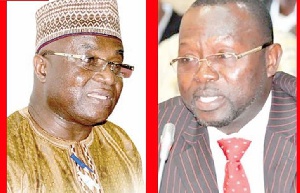Two bills – the Office of the Special Prosecutor Bill, 2017 and the Zongo and Inner City Development Fund Bill, 2017 – were introduced in Parliament yesterday and read for the first time amidst controversy over their constitutionality.
The bills were introduced in Parliament by a deputy Attorney General, Joseph Dindiok Kpemka and the Minister for Inner City and Zongo Development, Boniface Abubakar Saddique and were subsequently referred to the Constitutional, Legal and Parliamentary Committee in the case of the Special Prosecutor Bill and a joint committee of Finance and Local Government and Rural Development in the case of the Zongo Development Fund Bill.
The minority National Democratic Congress (NDC) Members of Parliament (MPs) led by the Member for Bolgatanga East, Dr Dominic Ayine – who was also the former deputy Attorney General – said the introduction of the two bills did not follow the right procedures as enshrined in Article 106 (b) of the 1992 Constitution.
The Article says a new bill ought to be gazetted 14 days before its introduction in Parliament, and the minority asserted that those two bills were neither gazatted nor given enough publication or notification before their introduction in Parliament.
The minority also strongly objected to the deputy Attorney General laying the bill on behalf of the substantive minister because of the important nature of the bill; but the majority leader, Osei Kyei-Mensah-Bonsu, pleaded with the speaker to allow the deputy Attorney General to lay the bill because the Attorney General, Gloria Akuffo, had relayed to him that President Nana Akufo-Addo had requested her to undertake a very important assignment for him.
The disagreement dragged on until the speaker, Prof Mike Oquaye, stepped in and allowed the deputy Attorney General to lay the bill.
Responding to the concerns of the minority members that the government had breached the Constitution in introducing those two bills, Mr Osei Kyei-Mensah-Bonsu said the two bills had been introduced under a certificate of urgency and that the same Constitution also allows that to be done under Article !06 (13).
According to him, the two bills were introduced on the strength of Article 106 Clause 13.
The majority leader said that considering the limited time left for Parliament to rise and the important nature of those bills, they had to be introduced under a certificate of urgency and that the minority would have to allow the committees to determine whether the bills are urgent or not.
He said that was not the first time such a process was being followed in the house.
The majority leader recalled that under the previous NDC administration, several bills were introduced in Parliament under certificate of urgency and that he found it very strange that the NDC minority members were seeing such process as unconventional or unconstitutional.
Prof Mike Oquaye ruled that the committees assigned to consider the bills be given the opportunity to determine the urgency of the bills before working on them.
He tasked the Constitutional, Legal and Parliamentary Committee and the joint Committee of Finance and Local Government and Rural Development to work on bills and make their submissions at the plenary in time.
Click to view details



General News of Wednesday, 19 July 2017
Source: dailyguideafrica.com

















